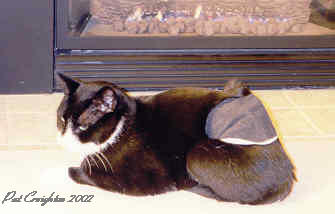

Here is Max, (right), my darling monkey who doesn't think twice about grabbing at legs when you try to descend the stairs while he is sunning himself on a step. In this photo, he was helping with the Christmas lights after being declared in remission from his first bout with renal lymphosarcoma. He loves to be a helper.
Max was diagnosed with renal lymphosarcoma in May of 2002, and had a serious battle with his cancer. The photo above left shows him being very tolerant with the bandage wrapped around his middle as he had a Transdermal Fentanyl Patch attached to a shaved spot. For the whole period of his chemo, Max was a fighter, and although he wasn't strong enough to have more than the most minimum amount of drugs administered to defeat the cancer, he perservered and kept us going through the dark hours with his impish spirit. He defeated the cancer and has been a jewel in our home ever since. We all love him, humans and cats alike.
A note here for owners of felines contracting cancer, that the cost of chemo is spread over the space of several months, and the benefit is spread over years. Well worth the attempt if your vet indicates there is a chance of recovery.
Since the original post for this, in October of 2005, Max was again diagnosed with renal cancer that had spread very quickly to a lump that was squeezing his throat so that he couldn't swallow. We syringe fed and got him onto the Dr. Rogers Fred III protocol that provided for a newish drug, Elspar, that shrank his tumour within a couple of days, so that he was soon eating on his own. In February 2006, he was once again declared in remission and as he is so happy these days, we have stopped the protocol to give him better quality of life, as we know the cancer will one day return. Lymphoma stays in the lymph fluids until it finds another target.
 At left, Max is eating lemon grass that we order regularly from Richters. Of all the types of grass we have supplied over the years, this is comparable in popularity with cat nip, which is why it has to be hung above the cat tree so that it can't be totally destroyed in one meal.
At left, Max is eating lemon grass that we order regularly from Richters. Of all the types of grass we have supplied over the years, this is comparable in popularity with cat nip, which is why it has to be hung above the cat tree so that it can't be totally destroyed in one meal.November 2006:
Recently, we noticed Max having increasing difficulty with his hind quarters, and his usual extremely talkative tail was drooping and silent. This slowly developed into paralysis in the hind end, with the worst event happening after an increase in his prednisone to twice the dose previously maintained without visible side effects, at 5mg per day. Max is now unable to use his hind quarters at all, and needs help with elimination of feces, as well as needing a diaper. He is still extremely active and alert, and has improved slightly as he is given four day batches of chemo directed at the blood brain barrier. We found useful information at Cats With Paralysis that helped keep us going.
Recently, we noticed Max having increasing difficulty with his hind quarters, and his usual extremely talkative tail was drooping and silent. This slowly developed into paralysis in the hind end, with the worst event happening after an increase in his prednisone to twice the dose previously maintained without visible side effects, at 5mg per day. Max is now unable to use his hind quarters at all, and needs help with elimination of feces, as well as needing a diaper. He is still extremely active and alert, and has improved slightly as he is given four day batches of chemo directed at the blood brain barrier. We found useful information at Cats With Paralysis that helped keep us going.
December 6, 2006:
On December 3rd, Max either had a nightmare in his bed, or heard the coyote that was checking the yard, (footprints in the snow). As DH puts it, he "shot" out of his bed and flew to the floor below, hitting his hind quarters on a stool on the way down. He has howled a bit, once in a while, when I am caring for him, and it appears that he either damaged himself when he 'flew' off the bed, or his cancer could be progressing. Whatever the reason, Max has not chosen to voluntarily climb on or off furniture since that point in time, and we are concerned. If we are very, it may turn out to be bruising or strained muscles, and he may heal. He still enjoys his physio to the point of purring when I do it.
Note: On the day that I had to choose to release Max from his pain, he was desperately straining to get away from it, in spite of limited ability to move, in what seemed a similar manner to the incident above, so we think that the serious pain he was experiencing started to appear at that point, and that it wasn't a nightmare at all. He seemed to go through periods of pain, and then recover, only to have it return. As Max was not a vocal boy, judging his pain was about the most difficult part of this experience. We know that there were times we probably medicated him when he didn't need it, however, at the end, he was short changed by our lack of understanding.
December 8, 2006
Max's vet came back from holiday yesterday, and we are lucky she did. She has better equipment, and more experience dealing with the lack of peristalsis connected to paralysis, and I wasn't sure if an assessment was going to suggest Max be put out of his misery. I had forgotten to provide his favorite food in with the diapers and warm blankets, and when DH and I stopped by to check on him after about six hours, we could hear his bellowing for food from the vet's office door as we entered. He went in looking like Kayla had, which frightened me, and now he was back to holding himself very erect, and was ready to eat like there was no tomorrow..........and there is.
This morning he was back to getting himself off furniture, although I haven't seen him climb onto anything yet.
We are aware that the Cytarabine Arabinoside, aka Cytosar-U has not reduced the paralysis after treatment. This is what we expected as sources of information such as the one above clarify that this drug "interferes with the growth of cancer cells, which are eventually destroyed". The maintenance chemo he is on did not prevent the paralysis, so we believe he may be living on borrowed time, however, the standard life expectancy, with chemo, for his condition, is one year, and he is well into his fifth.
December 14, 2006
Max cannot pull himself around much any more. A foot or two at a time exhausts him, and he usually stops there and waits for someone to notice his distress. On the night of December 12, I went to move him from his 'dinner table' where he was sharing with the other boys, and after a couple of quiet wimpers to let me know he was uncomfortable, he swung around and bit my hand deeply, to the degree that I had to have a tetanus shot and antibiotics as the bite was looking red by next morning. Max has always been a gentle soul, no matter what, so he must have been in severe pain.
Luckily I had Metacam in the boys' medicine chest, with instructions for dosing Max, and the product was only a year old, so I gave him a loading dose for pain immediately. Shortly thereafter he was quite content to be 'serviced' with food and water throughout the night as he was feeling better. This is not all due to the paralysis. We are assuming that the cancer has returned to his body in other parts that may be swelling and causing him discomfort, so we are keeping him on Metacam for the time being. This seems to make him very comfortable and ready to check out birds, squirrels, and toys for brief encounters.
An added major concern for us is ensuring he is not dehydrated as he can't reach water on his own, and would spill any container that he could use withouth help.
When we were bringing Max home from the vet yesterday, he was pulling himself up to the car window with the two working legs he has left, and was very interested in everything that was happening around him, as he always has been in the car. He was also attempting to move around to fend for himself when we were out for a few hours, later. It is also very important to him that he be with the other boys, even if he can only observe the interactions and not take part. He is showing clear signs of wanting to be on this earth, with his family.
December 16. 2006
The metacam wasn't working yesterday, and all other options could not keep ahead of what was causing the pain to increase in Max's little body so quickly, and to such a degree of pain that he showed he was in agony. He had been frantically trying to get away from the pain and howling at me to fix it, but finally I didn't have any answers left for him, other than to give him the final escape. At 5:50PM, December 15, 2006, we released Max from his pain, and now there is a very big hole in our lives.
The last few weeks of Max's life, I was noticing that he could not hold his spine straight when I lifted his back legs. Early in the paralysis, he would happily run around on front feet while I held his hind feet above the floor. His favorite trick had been trying to take me under furniture, and through the tunnel used by all the boys. If he flipped over to his right side, near the end, he would cry out and writhe around until he got back over to his left side. Any time I tried to lift his hind legs to help him move faster and more easily to his destination, he could not move his front legs well, and his body was quite twisted. He was better managing on his own. At the end, we did not want to put Max through any more tests to give us answers, so we can only assume that the tumor grew to be a major problem in his spine, and possibly the change in posture as he pulled himself around caused stress on his spine as well.
 It is extremely hard for any pet owner to switch from primary caregiver to being the person that chooses the release from pain for an animal in distress. While I have trained in courses that include writings by Elizabeth Kubler Ross, this doesn't exempt me from travelling through the stages of grief, as does every human being, each in their own time.
It is extremely hard for any pet owner to switch from primary caregiver to being the person that chooses the release from pain for an animal in distress. While I have trained in courses that include writings by Elizabeth Kubler Ross, this doesn't exempt me from travelling through the stages of grief, as does every human being, each in their own time.
